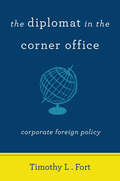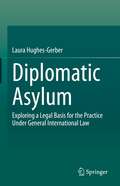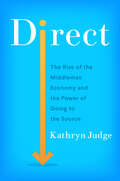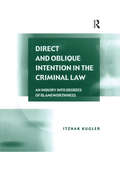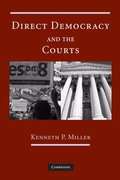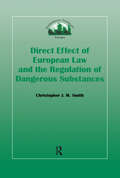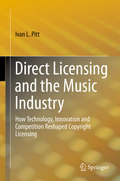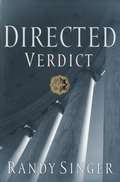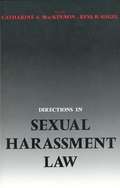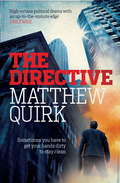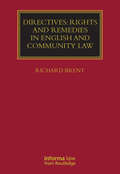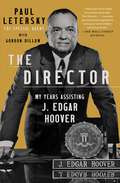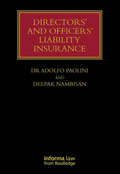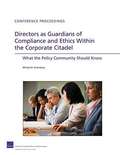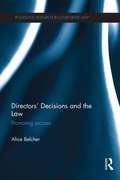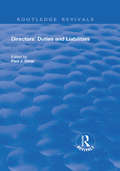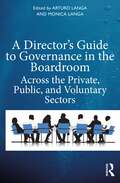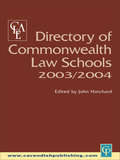- Table View
- List View
Diplomacy and Negotiation for Humanitarian NGOs
by Albert Simard Larry Winter Roeder Jr.Diplomacy and Funding for Humanitarian Non-Profits is a practical guide to best practices in diplomacy and negotiation for non-profits (NGOs) who work to convince governments and international institutions to effectively protect humans through disaster assistance, sustainable development and the protection of cultures. The volume proposes a holistic approach to humanitarian assistance by integrating non-traditional and traditional humanitarian partners. Users of the book will be prepared to speak to diplomats and government officials in any setting, including war zones. The book mainly focuses on approaching local and national governments, the United Nations system, the international Red Cross movement and other international organizations. The reader will learn the rules of "diplomatic protocol", and much about the rules and procedures of major international bodies, as well as how to leverage media and knowledge management for planning, establishing, and managing a humanitarian initiative. To provide balance and real world relevance, the guide draws on a compilation of the extensive activities of both authors across a range of development, emergency management, knowledge management, and climate issues in government and in the NGO world, as well as interviews with a broad range of scholars and officials from NGOs, diplomatic missions, the media, the United Nations, the Red Cross, governments and corporations.
Diplomacy, Funding and Animal Welfare
by Larry Winter Roeder Jr.Diplomacy, Funding and Animal Welfare is a practical guide to the best diplomatic and negotiation practices needed to convince governments and international institutions to effectively protect animals, which also introduces new approaches to fundraising. Animal protection advocates are prepared for speaking to diplomats and government officials in any setting, and to combatants in war zones. The book mainly focuses on approaching local and national governments, the United Nations system, the international Red Cross movement and systems related to other international organizations that can help animals, often in surprising ways. The reader will learn the rules of "diplomatic protocol", and much about the rules and procedures of major international bodies. To provide balance and real world relevance, the guide draws on a compilation of the author's extensive activities across a range of development, animal welfare, emergency management and climate issues in government and in the NGO world, as well as interviews with scholars and officials from NGOs, diplomatic missions, the United Nations, the Red Cross, governments and corporations.
The Diplomat in the Corner Office: Corporate Foreign Policy
by Timothy L. FortIn The Diplomat in the Corner Office, Timothy L. Fort, one of the founders of the business and peace movement, reflects on the progress of the movement over the past 15 years--from a niche position into a mainstream economic and international relations perspective. In the 21st century global business environment, says Fort, businesses can and should play a central role in peace-building, and he demonstrates that it is to companies' strategic advantage to do so. Anchoring his arguments in theories from economics and international relations, Fort makes the case that businesses must augment familiar notions of corporate responsibility and ethical behavior with the concept of corporate foreign policy in order to thrive in today's world. He presents a series of case studies focusing on companies that have made peace a goal, either as an end in itself or because of its instrumental value in building their companies, to articulate the three different approaches that businesses can use to quell international conflict-- peace making, peace keeping, and peace building. He then demonstrates their effectiveness and proposes policies that can be utilized by business, civil society, and government to increase the likelihood of business playing a constructive role in the conciliatory process. This book will be of enormous use not only to students and scholars but also to leaders in NGOs, government, and business.
Diplomatic Asylum: Exploring a Legal Basis for the Practice Under General International Law
by Laura Hughes-GerberFollowing the vexed codification attempts of the International Law Commission and the relevant jurisprudence of the International Court of Justice, this book addresses the permissibility of the practice of diplomatic asylum under general international law. In the light of a wealth of recent practice, most prominently the case of Julian Assange, the main objective of this book is to ascertain whether or not the practice of granting asylum within the premises of the diplomatic mission finds foundation under general international law. In doing so, it explores the legal framework of the Vienna Convention on Diplomatic Relations 1961, the regional treaty framework of Latin America, customary international law, and a possible legal basis for the practice on the basis of humanitarian considerations. In cases where the practice takes place without a legal basis, this book aims to contribute to bridging the legal lacuna created by the rigid nature of international diplomatic law with the absolute nature of the inviolability of the mission premises facilitating the continuation of the practice of diplomatic asylum even where it is without legal foundation. It does so by proposing solutions to the problem of diplomatic asylum. This book also aims to establish the extent to which international law relating to diplomatic asylum may presently find itself within a period of transformation indicative of both a change in the nature of the practice as well as exploring whether recent notions of humanity are superseding the traditional fundaments of the international legal system in this regard.
Diplomatic Counterinsurgency
by Philippe Leroux-MartinWar does not stop when the armed conflict ends. This compelling eyewitness account of a key political crisis in Bosnia and Herzegovina in 2007 demonstrates how interventions from foreign powers to end armed conflict can create new forms of conflict that are not only as determined and resilient, but can lead groups to challenge the power of fragile states through political and legal means. Countering such challenges is an integral but often ignored part of peace processes. How do these nonviolent wars evolve? How can the power of fragile states be challenged through nonviolent means in the aftermath of armed conflict? And what is the role of diplomacy in countering such challenges? This book offers key insights for policy makers dealing with fragile states who seek answers to such questions.
Direct: The Rise of the Middleman Economy and the Power of Going to the Source
by Kathryn JudgeFinance expert, law professor, and fellow overwhelmed consumer Kathryn Judge investigates the surprising ways that middlemen have taken control of the economy at the expense of the rest of us, and provides practical guidance about how to regain control, find more meaning, and contribute to a more sustainable economy. Over the past thirty years, middlemen have built intricate financial and retail empires capable of moving goods across the country and around the world—transforming the economy and our lives. Because of middlemen, we enjoy an unprecedented degree of choice and convenience. But the rise of the middleman economy comes at a steep price.In Direct, Columbia law professor Kathryn Judge shows how overgrown middlemen became the backbone of modern capitalism and the cause of many of its ailments. Middlemen today shape what people do, how they invest, and what they consume. They use their troves of data to push people to buy more, and more expensive, products. They use their massive profits and expertise to lobby lawmakers, tilting the playing field in their favor. Drawing on a decade of research, Judge shows how to fight back: Go to the source.The process of direct exchange—and the resulting ecosystem of makers and consumers, investors and entrepreneurs—fosters connection and community and helps promote a more just, resilient, and accountable economic system. Direct exchange reminds us that our actions always and inevitably impact others, as it rekindles an appreciation of our inherent interconnectedness. As Judge reveals in this much-needed book, direct exchange is both the cornerstone of the solution and a tool for revealing just how much is at stake in decisions about “through whom” to buy, invest and give.
Direct and Oblique Intention in the Criminal Law: An Inquiry into Degrees of Blameworthiness
by Itzhak KuglerThe subject of intention in the criminal law is currently causing many debates among criminal lawyers. This compelling and probing volume addresses two key questions: should the criminal law distinguish between direct intention and recklessness, and what should the law be concerning cases of oblique intention - i.e. cases in which the actor does not act in order to cause the proscribed result, but is nevertheless practically certain that his, or her, action will cause it? The discussion is divided into two parts with the first being devoted to the question of whether it is justified to grade offences based on the distinction between intention and recklessness. The second part deals with offences in which intention is required as a condition for the criminalisation of the conduct and in the context of which reckless actors are not exposed to criminal liability. The book explores the issue of intention from the viewpoint of degrees of moral culpability and it discusses, inter alia, the doctrine of double effect, the possibility that the law in cases of oblique intention should not be the same for all crimes of intention , and the possibility of using a moral formula in the definition of certain offences. The discussion also addresses many other criminal law issues, including the philosophy of punishment, the role of motives in determining degrees of blameworthiness, sentencing, stigma, and criminal attempts.
Direct Democracy and the Courts
by Kenneth P. MillerWho should have the last word on fundamental policy issues? This book analyzes the rise of two contenders - the people, through direct democracy, and the courts. Introduced in the U.S. during the Progressive Era and now available in nearly half the states, direct democracy has surged in recent decades. Through ballot measures, voters have slashed taxes, mandated government spending, imposed term limits on elected officials, enacted campaign finance reform, barred affirmative action, banned same-sex marriage, and adopted many other controversial laws. In several states, citizens now bypass legislatures to make the most important policy decisions. However, the "people's rule" is not absolute. This book demonstrates that courts have used an expanding power of judicial review to invalidate citizen-enacted laws at remarkably high rates. The resulting conflict between the people and the courts threatens to produce a popular backlash against judges and raises profound questions about the proper scope of popular sovereignty and judicial power in a constitutional system.
Direct Effect Of European Law
by Christopher J SmithFirst Published in 1995. Routledge is an imprint of Taylor & Francis, an informa company.
Direct Licensing and the Music Industry
by Ivan L. PittThis book discusses the economics of the music industry in the context of the changing landscape brought about by innovation, technological change, and rapid digitization. The ability of digital technology to reduce the transaction costs of music copyright licensing has all but destroyed the traditional media business models of incumbent Performance Rights Organizations (PROs), music publishers, record labels, and radio and television stations. In a climate where streaming services are rapidly proliferating and consumers prefer subscription models over direct ownership, new business models, such as direct licensing, are developing. This book provides an overview of the economics of the traditional music industry, the technology-induced changes in business models and copyright law, and the role of publishers, copyright holders and songwriters in the emerging direct licensing model. In Part One, the author examines the economic aspects of direct licensing as an alternative to the traditional blanket license for copyrighted musical compositions, with an emphasis on the often monopolistic nature of PROs. In Part Two, the author focuses on the music publisher and the role direct licensing and competition may play in the changing business models in the music industry and the potential benefits this may bring to copyright holders, such as songwriters. To compliment this model, the author proposes a maximum statutory fixed-rate for musical performances to further streamline the royalty process, especially where distributors such as Google and YouTube are concerned. This book adds to the growing body of literature on the economics of music licensing in the digital age. It will be useful to those in the fields of economics and law, as well as music executives, musicians, songwriters, composers, and other industry professionals who are interested in understanding how technology, innovation and competition have reshaped the music industry.
Directed Verdict
by Randy SingerIn Saudi Arabia, two American missionaries are targeted by the infamous religious police. The man is killed; his wife arrested and deported to the United States. Compelled by the injustice of her plight, an attorney files an unprecedented civil rights suit against Saudi Arabia and the ruthless head of the Muttawa.
Directions in Sexual Harassment Law
by Catharine A. Mackinnon Reva B. SiegelWhen it was published twenty-five years ago, Catharine MacKinnon's pathbreaking work Sexual Harassment of Working Women had a major impact on the development of sexual harassment law. The U. S. Supreme Court accepted her theory of sexual harassment in 1986. Here MacKinnon collaborates with eminent authorities to appraise what has been accomplished in the field and what still needs to be done. An introductory essay by Reva Siegel considers how sexual harassment came to be regulated as sex discrimination. Contributors discuss how law can best address sexual harassment; the importance and definition of consent and unwelcomeness; issues of same-sex harassment; questions of institutional responsibility for sexual harassment in both employment and education settings; considerations of freedom of speech; effects of sexual harassment doctrine on gender and racial justice; and transnational approaches to the problem. An afterword by MacKinnon assesses the changes wrought by sexual harassment law in the past quarter century.
The Directive (Mike Ford)
by Matthew QuirkNever bet in another man's game, they say, but what if that man is your brother and the hand he's been dealt is lethal? Michael Ford has worked tirelessly to escape his criminal past and finally has it all: a beautiful fiancée and a promising career. Yet his brother Jack's return threatens to unravel everything. Embroiled in a billion-dollar conspiracy against the Federal Government, the only way Jack can come out alive is with Mike's help.Sucked back into the dark criminal underworld against his will, Mike soon realises the only way to secure his future is to walk straight back into his past.
The Directive (Mike Ford)
by Matthew QuirkWhat if the only way to go straight is to break the law?Michael Ford has finally escaped his chequered past to lead the respectable life he's always dreamed of, preparing to settle down with his fiancée Annie. But the quiet is shattered when his brother, Jack, comes back into his life.Jack is a world-class con man who has finally overplayed his hand. He's in way over his head in a conspiracy to steal a billion-dollar secret from the heart of the financial system. And in an effort to help his brother, Mike soon finds himself trapped by the dangerous men in charge - and responsible for pulling off the heist himself. With Annie's safety on the line, Mike tries to figure out who's behind the job - and realises the only way to keep the honest life is to return to his criminal past. But will he get in too deep to save Annie's life?(P)2014 Hachette Audio
Directives: Rights and Remedies in English and Community Law
by Richard BrentDirectives: Rights and Remedies in English and Community Law analyses the impact of EC Directives on national law, which has long been a problem and continues to be so - both in terms of interpretation and implementation. This book from barrister Richard Brent provides the reader with practical and invaluable insights on the legislative processes involved, the legal basis for adoption of Directives, the transposition and implementation of Directives.
The Director: My Years Assisting J. Edgar Hoover
by Paul LeterskyThe first book ever written about FBI Director J. Edgar Hoover by a member of his personal staff—his former assistant, Paul Letersky—The Director offers unprecedented insight into an American legend.The 1960s and 1970s were arguably among America&’s most turbulent post-Civil War decades. While the Vietnam War continued seemingly without end, protests and riots ravaged most cities, the Kennedys and MLK were assassinated, and corruption found its way to the highest levels of politics, culminating in Watergate. In 1965, at the beginning of the chaos, twenty-two-year old Paul Letersky was assigned to assist the legendary FBI director J. Edgar Hoover who&’d just turned seventy and had, by then, led the Bureau for an incredible forty-one years. Hoover was a rare and complex man who walked confidently among the most powerful. His personal privacy was more tightly guarded than the secret &“files&” he carefully collected—and that were so feared by politicians and celebrities. Through Letersky&’s close working relationship with Hoover, and the trust and confidence he gained from Hoover&’s most loyal senior assistant, Helen Gandy, Paul became one of the few able to enter the Director&’s secretive—and sometimes perilous—world. Since Hoover&’s death half a century ago, millions of words have been written about the man and hundreds of hours of TV dramas and A-list Hollywood films produced. But until now, there has been virtually no account from someone who, for a period of years, spent hours with the Director on a daily basis. Balanced, honest, and keenly observed, The Director offers a unique inside look at one of the most powerful law enforcement figures in American history.
Directors' and Officers' Liability Insurance (Lloyd's Insurance Law Library)
by Adolfo Paolini Deepak Nambisan“With the ever increasing number of claims against directors and officers, this book provides a very welcome addition to the bookshelves which hitherto have lacked books on this important area” - Alison Green, Chairman of the Trustees of the BILA Charitable Trust. This book scrutinises the origins and the rationale underlying D&O insurance, and provides answers to the question of protecting directors against the potential liabilities they may face. It provides clear understanding about D&O policies wording, exclusions and issues of misrepresentation. The information contained in this new book includes Nature and Legality of D&O Liability Insurance, D&O Exclusions, Directors’ and Officers’ Liability to Third Parties, Directors’ Liability at Civil Law, D&O: Defence Costs Cover and Allocation, Aggregation Principles and D&O Cover and the Reinsurance of D&O Policies.
Directors as Guardians of Compliance and Ethics Within the Corporate Citadel
by Michael D. GreenbergRAND convened a symposium on the perspective and role of corporate boards of directors in overseeing their firms' ethics and compliance matters. These conference proceedings summarize the event and the discussions, which focused on oversight challenges that directors face, board responsibility for corporate culture, and steps that business leaders and policymakers might take to better encourage and empower directors in their oversight role.
Directors' Decisions and the Law: Promoting Success (Routledge Research in Corporate Law)
by Alice BelcherDirectors are key decision-makers in any organisation, whether it is in the public sector, a family business or a transnational company. The UK Companies Act 2006 codified directors’ duties for the first time and describes the director as the ‘most likely to promote the success of the company for the benefit of its members as a whole’. This book addresses key tensions and problems involved in the duties and responsibilities of the director in promoting success, including corporate culture and credibility, trust, risk and uncertainty, collective responsibility, and the degree of control. The book considers directors’ decision-making in both private and public sector organisations and explicitly examines aspects of decision-making during periods of financial distress. The book compares the legal contexts of director’s decisions in the UK to those of the USA, Germany and Australia, and takes an interdisciplinary approach in its combination of management theory, economic theory and behavioural studies. In doing so the book addresses issues key to the understanding of corporate governance in light of recent financial crises.
Directors' Duties and Liabilities
by Paul J. OmarThis title was first published in 2000. The law relating to directors’ duties has fundamental implications across the business environment and yet few areas of business law have received so little detailed examination. This text provides fresh and incisive insights to the rules applying in ten major economic jurisdictions within Europe, with respect to directors’ legal obligations and liabilities. Written by the foremost figures in the field, each contribution outlines the statutory provisions that affect the work of company directors in each jurisdiction, including general legislation and specific laws covering the status of incorporated bodies. Fully illustrated with case-law examples the book provides a guide to the range of measures which national courts may provide for participants in corporate life seeking remedies for unsatisfactory governance of companies. It also features guidance on the specific bases for criminal and civil liabilities and examples of the range of penalties to which directors might be subject. The result is a work of unprecedented detail which will be welcomed by practitioners in the corporate sector, academics and researchers alike.
A Director's Guide to Governance in the Boardroom: Across the Private, Public, and Voluntary Sectors
by Arturo LangaThis book is a practical guide for executive and non-executive directors and aspiring directors to lead, govern, and steer UK-based organisations to long-term sustainable success. In today’s turbulent environment, corporate governance is increasingly scrutinised, and this book will consider how directors can ‘bring the future forward’ with respect to responsible and ethical governance and leadership against the challenging political, environmental, and economic backdrop. While other books discuss UK corporate governance, this one uniquely demonstrates how the work of directors can build an organisation’s antifragility, and offers a view of stewardship approaches to every sector and type of UK organisation, from large premium listed companies to start-ups, the public sector, not-for-profits, partnerships, and family-owned and private-equity-backed organisations. Aspiring and experienced directors will each benefit from this book as well as those who provide board evaluation services, professional advisers, auditors, and those who provide training and other support for board members.
A Director's Guide to Governance in the Boardroom: Across the Private, Public, and Voluntary Sectors
by Arturo LangaThis book is a practical guide for executive and non-executive directors and aspiring directors to lead, govern, and steer UK-based organisations to long-term sustainable success. In today’s turbulent environment, corporate governance is increasingly scrutinised, and this book will consider how directors can ‘bring the future forward’ with respect to responsible and ethical governance and leadership against the challenging political, environmental, and economic backdrop. While other books discuss UK corporate governance, this one uniquely demonstrates how the work of directors can build an organisation’s antifragility, and offers a view of stewardship approaches to every sector and type of UK organisation, from large premium listed companies to start-ups, the public sector, not-for-profits, partnerships, and family-owned and private-equity-backed organisations. Aspiring and experienced directors will each benefit from this book as well as those who provide board evaluation services, professional advisers, auditors, and those who provide training and other support for board members.
Directory of Commonwealth Law Schools 2003-2004
by CleaThere are more than 400 Commonwealth law schools, all having an entry within the latest edition of The Directory of Commonwealth Law Schools. Each entry includes full contact details, courses offered, law journals published and research centres. This edition has been thoroughly revised, updated and expanded to take account of changes over the last two years. This directory also contains full details of the activities of the Commonwealth Legal Education Association together with a section devoted to law in the Commonwealth. This includes copies of the major Commonwealth instruments and details of Commonwealth activities of particular interest to law teachers and practitioners, making it a valuable resource and reference work.
Directory of Microbicides for the Protection of Materials
by Wilfried PaulusThis edition is divided into two parts. Part One presents extensively diversified contributions from 23 world experts, on such topics as: Microbicides with regard to the relationship between chemical structure and mode of action and activity; Research and development in consideration of registration procedures; Legislative aspects. The use of microbicides in 18 major application areas are described in detail. Part Two collects Microbicide Data, organized into 21 substance classes (e.g. alcohols, aldehydes, acids, amides, etc.), and including some 300 entries.
Direkte Demokratie und Kommunikation: Studien zu kommunalen Bürgerentscheiden und Einwohneranträgen (Politik gestalten - Kommunikation, Deliberation und Partizipation bei politisch relevanten Projekten)
by Frank BrettschneiderDieses Buch thematisiert Bürgerentscheide als Instrument direkter Demokratie auf der kommunalen Ebene. Auch Gemeinderäte greifen auf dieses Instrument direkter Demokratie zurück, um die Legitimationsbasis für besondere Projekte zu vergrößern. Bei den Abstimmungen sollten sachfremde Aspekte möglichst keine Rolle spielen. Daher sind die Verständlichkeit des Fragewortlauts sowie die Qualität der Abstimmungsbroschüren besonders wichtig. Ebenfalls sehr wichtig sind vorgeschaltete dialogische Beteiligungsverfahren (z. B. Bürger-Foren). Sie verbessern in der Regel die Abstimmungsqualität.


